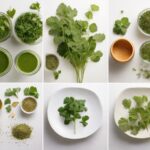Vegetarianism has emerged as an increasingly popular lifestyle and dietary choice worldwide. By embracing this dietary approach, you’re not only making a choice for your health but also contributing to animal welfare and environmental sustainability. This comprehensive guide for beginners in vegetarianism is designed to provide you with a detailed, step-by-step understanding of how to successfully transition to a vegetarian diet.
Introduction to Vegetarianism
Vegetarianism is defined as a dietary style that excludes meat and, in many cases, other animal products such as fish, poultry, dairy, and eggs. Instead, vegetarians rely on plant-based foods such as fruits, vegetables, whole grains, legumes, nuts, and seeds. This dietary approach offers a wide range of benefits, from improving personal health to promoting animal welfare and environmental protection.
Benefits of Vegetarianism
Before delving into the details of adopting a vegetarian diet, it’s essential to understand the numerous benefits that this choice can offer:
- Improved Health: Numerous studies have shown that a well-balanced vegetarian diet can reduce the risk of chronic diseases such as heart disease, type 2 diabetes, and certain types of cancer. By focusing on whole, nutrient-rich foods, vegetarians may experience increased vitality and longevity.
- Weight Loss: Adopting a vegetarian diet can help control body weight and promote weight loss. By focusing on low-calorie, fiber-rich foods, vegetarians can feel satisfied with smaller portions and reduce overall calorie intake.
- Animal Welfare: Vegetarianism avoids participation in the meat industry, which often involves the suffering and exploitation of animals. By opting for plant-based foods, vegetarians are contributing to the promotion of ethical eating and respect for all forms of life.
- Environmental Sustainability: Plant-based food production generally requires fewer natural resources and produces fewer greenhouse gas emissions compared to meat production. By adopting a vegetarian diet, individuals can reduce their ecological footprint and contribute to environmental protection.
Steps to Adopting a Vegetarian Diet
Now that you understand the benefits of vegetarianism, it’s time to explore practical steps to transition to this diet:
1. Education and Preparation
Before making the switch, take time to educate yourself about vegetarianism and its different approaches. Read books, research online, and talk to people who already follow this diet. Familiarize yourself with the nutrients you need to obtain from plant sources and plan your diet accordingly.
2. Define Your Approach
Vegetarianism is not one-size-fits-all. There are different approaches you can consider:
3. Diet Planning
Once you’ve defined your approach, it’s important to plan your meals to ensure you’re getting all the necessary nutrients. Include a variety of foods such as fruits, vegetables, whole grains, legumes, nuts, and seeds. Consider consulting a registered dietitian for personalized guidance on planning a balanced, nutritious diet.
4. Explore New Foods and Recipes
One of the best parts of adopting a vegetarian diet is the opportunity to explore new foods and recipes. Try different fruits, vegetables, grains, and legumes to keep your diet varied and exciting. Experiment with different cooking methods and seasonings to add flavor and variety to your meals.
5. Inform Others
You may encounter resistance or misunderstanding from friends and family about your decision to become vegetarian. Explain your reasons clearly and respectfully, and offer food options when invited to social events. Share information about the benefits of vegetarianism and how this choice aligns with your personal values.
6. Stay Flexible and Compassionate
Remember that adopting a vegetarian diet is a process, and it’s normal to make mistakes or face challenges. Maintain a flexible and compassionate attitude toward yourself and others as you transition. Celebrate your achievements and progress, and don’t be discouraged by temporary setbacks.
Additional Tips for a Successful Transition
- Read Labels: When buying processed foods, make sure to check labels to identify animal-derived ingredients. Many products may contain surprising ingredients such as gelatin, rennet, or insect-derived colorings.
- Find Support: Seek out local or online support groups where you can connect with other people following a vegetarian diet. Share your experiences, receive helpful advice, and find inspiration to maintain your commitment to vegetarianism.
- Experiment with Supplements: While a well-balanced vegetarian diet can provide most of the nutrients you need, you may want to consider taking vitamin B12 and vitamin D supplements to ensure you’re getting enough essential nutrients.
- Listen to Your Body: Pay attention to how your body feels as you transition and adjust your diet as needed. If you experience symptoms such as fatigue, weakness, or nutritional deficiencies, consult a healthcare professional for further guidance.
Conclusion
Adopting a vegetarian diet can be a rewarding experience beneficial for your health, animal welfare, and the environment. With the right information and steps, you can make a successful transition to a vegetarian lifestyle. Remember that every small change you make makes a difference, both for yourself and the world around you. Good luck on your journey to vegetarianism!
Explore our e-shop and take your culinary experience to the next level! At Cooking Landia, we have carefully selected the finest kitchen utensils and products for you. From high-quality chef’s knives to durable cookware, and innovative culinary gadgets, you’ll find everything you need to equip your kitchen like a true professional. Discover our curated collection and choose the products that will make cooking even more exciting and efficient. Visit our e-shop now and turn every moment in the kitchen into an extraordinary experience! 🍳🔪🍴
More content
- White Fish vs. Blue Fish: Which is Better for Your Health?

- Vegetarianism for Beginners: Simple Steps to Adopt This Lifestyle

- Unlock Your Culinary Potential: Beginner’s Guide to Essential Techniques

- Title: Culinary Traditions in Festivals: Festive Flavors of the World

- The Secrets of Perfect Seafood Cooking: Kitchen Tricks

- The Secrets of African Cuisine: Traditional Recipes and Flavors

- The Most Impactful Gastronomic Trends Shaping the World

- The Great Masters of Cuisine: Contributions to its Evolution

- The Evolution of Food: Traditional vs. Modern Cuisine Compared

- The 10 Most Exclusive Gourmet Products You Must Try

- Taste the Best of Africa: Top 5 Iconic Regional Recipes

- Taste of the Mediterranean: 5 Key Dishes

- Symbolism of Food: The Meaning in Every Bite

- Sustainable Dishes: Gastronomic Trends for a Greener Future

- Starting Out in the Kitchen: Pro Chef Tips for Beginners

- Spices Through Time: Understanding Their Historical Importance

- Simple Mediterranean Cooking for Beginners: Impress Your Guests!

- Secrets of Latin American Cuisine: Traditional and Authentic Recipes You Must Try

- Secrets of Asian Cuisine: Discovering 8 Traditional Techniques

- Revealing the Superfood Potential of Red Fruits: Benefits & Recipes

- Protein Sources in a Vegan Diet: What to Do?

- Probiotic Foods: How Do They Improve Your Digestive Health?

- Perfect Pairing: Wines and Dishes for Gastronomic Celebrations

- Myths and Legends: The Magical Stories Behind Foods

- Menus for Allergen-Free Diets: The Best Recipes and Nutritional Strategies

- Mastering Healthy Cooking: Unveiling 4 Low-Fat Secrets

- Master Your Kitchen: 10 Unexpected Tips for Easy Cooking

- Low-Carb Diets: Top 10 Recommended Foods

- Low-Carb Diet: A Beginner’s Guide

- Innovation in Cuisine: Gourmet Products in Traditional Recipes

- Iconic Dishes of Spanish Cuisine by Region

- How to Choose the Best Poultry for Your Recipes

- Homemade Sushi: Simple Steps to Prepare Your Favorite Rolls

- Historia del Chocolate: De los Aztecas al Presente

- Healthy Breakfasts: 7 Nutritious Recipes for the Whole Week

- Healthy and Affordable Recipes: Eating Well Without Spending Much

- Gastronomy and Folklore: Culinary Traditions and Local Myths

- Gastronomía egipcia: dieta y recetas ancestrales

- From Fusion to Tradition: 4 Global Gastronomic Trends

- From Farm to Table: How to Select Quality Meat

- Flavors of the World: A Journey Through Diverse Culinary Influences

- Exploring Flavors: Top 10 Typical Dishes of Latin America

- Efficiency Unleashed: Explore the Art of Mise en Place

- Easy Gluten-Free Recipes for Every Day of the Week

- Dietary Plans for Food Allergies: Top 10 Tips and Recommendations

- Culinary Secrets Unveiled: Elevate Your Cooking with Simple Ingredient Tricks

- Culinary Journey: Discovering Culinary Traditions from Different Cultures

- Culinary Innovations: The Most Impactful Gastronomic Trends

- Culinary Globalization: Exploring 6 Iconic World Dishes

- Complete Guide: Enhance Your Dishes with Fresh Herbs

- Complete Guide to Gluten-Free Diets: Tips for Beginners

- Complete Guide to Cooking Methods: Everything You Need to Know

- Comida Callejera en el Mundo: Historia y Platos Típicos

- Boost Your Immune System: The Best 10 Foods

- Art of Fruit and Vegetable Cutting: Expert Techniques Revealed

- A Gastronomic Journey: Migratory Influences in the Cuisine

- 6 Healthy Recipes for a Balanced and Delicious Diet

- 5 Great Gastronomic Moments: Historic Milestones in the Cuisine

- 15 Foods to Maintain a Balanced and Nutritious Diet

- 10 Latin American Sweets: Tempting Dessert Adventures Await


